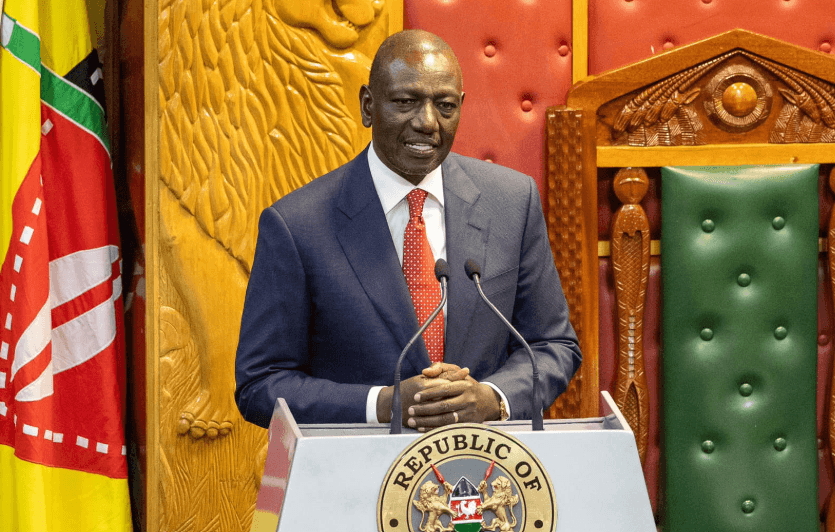We're loading the full news article for you. This includes the article content, images, author information, and related articles.
President Ruto’s State of the Nation address details a multi-trillion shilling ambition to emulate Singapore’s economic success, coinciding with strengthening bilateral ties through new tax and investment treaties.

President William Ruto on Thursday, November 20, 2025, articulated an ambitious KSh5 trillion development blueprint designed to transform Kenya into a first-world economy, explicitly citing Singapore as a model for his vision. In his third State of the Nation Address before a joint session of Parliament, the President declared his goal is to elevate Kenya from a developing to a developed nation, a vision he described as rising “from the Third to the First World.”
The President’s address, delivered at approximately 2:30 PM EAT, centered on a four-pillar strategy: investing in human capital, transforming the economy from a net importer to an exporter, boosting energy generation, and modernizing transport and logistics infrastructure. “For too long, our ambition was held hostage by small thinking and ordinary expectations,” President Ruto stated, defending his economic policies against criticism. He argued that the facts of his administration's progress are “available for all to examine.”
Key infrastructure targets outlined include generating an additional 10,000 megawatts of energy, tarmacking 28,000 kilometers of roads over the next decade, and extending the Standard Gauge Railway (SGR) from Naivasha to Malaba, with construction slated to begin in January 2026. The plan also calls for the construction of 50 mega-dams and 200 smaller dams to expand irrigation and reduce the nation's reliance on food imports, which currently cost approximately KSh500 billion annually.
The President's aspirational rhetoric is underpinned by concrete diplomatic and economic engagements with Singapore. This strategic alignment was solidified earlier in the year when the Kenyan Cabinet, in a meeting chaired by President Ruto on February 11, 2025, formally approved the ratification of a new Agreement for the Elimination of Double Taxation (DTA) with Singapore. This agreement, signed by Foreign Affairs Cabinet Secretary Musalia Mudavadi and Singapore's Foreign Minister Dr. Vivian Balakrishnan on September 23, 2024, replaces a previous 2018 accord that was never enforced. The DTA is designed to prevent fiscal evasion and lower barriers to cross-border investment, fostering deeper economic cooperation.
This follows the entry into force of the Kenya-Singapore Bilateral Investment Treaty (BIT) on August 20, 2023. The BIT provides significant protections for investors from both nations, including guarantees against illegal expropriation and the freedom to transfer capital and returns. These legal frameworks are crucial for attracting the foreign direct investment needed to fund the President's ambitious development agenda.
The relationship is viewed as mutually beneficial. Kenyan officials see Singapore as a vital gateway for Kenyan products into the expansive Southeast Asian market, a region with a population of approximately 670 million. Conversely, Singaporean leaders and businesses view Kenya as a strategic hub for accessing the East African and broader continental market. Enterprise Singapore, a government agency, established a regional office in Nairobi in 2018 to facilitate this two-way trade and investment. Bilateral trade has shown significant growth, amounting to over S$212 million (approximately KSh21 billion) in 2022.
Cooperation extends beyond trade, encompassing skills development, climate change, and technology. During a visit to Nairobi by then-Prime Minister Lee Hsien Loong in May 2023, the two nations signed Memoranda of Understanding (MOUs) on ICT, skills development, and climate change, including collaboration on carbon credits under Article 6 of the Paris Agreement. A Singaporean delegation is expected in Kenya in January 2026 to further negotiations on a bilateral carbon market agreement. President Ruto has also expressed keen interest in learning from Singapore's highly successful public housing model.
While the President’s vision of transforming Kenya into an African “Singapore” faces significant economic and logistical hurdles, the deliberate strengthening of bilateral ties through treaties and high-level cooperation indicates a clear strategic roadmap. The successful implementation of these agreements will be critical in determining whether Kenya can attract the necessary investment to turn its first-world aspirations into reality.
Keep the conversation in one place—threads here stay linked to the story and in the forums.
Sign in to start a discussion
Start a conversation about this story and keep it linked here.
Other hot threads
E-sports and Gaming Community in Kenya
Active 9 months ago
The Role of Technology in Modern Agriculture (AgriTech)
Active 9 months ago
Popular Recreational Activities Across Counties
Active 9 months ago
Investing in Youth Sports Development Programs
Active 9 months ago